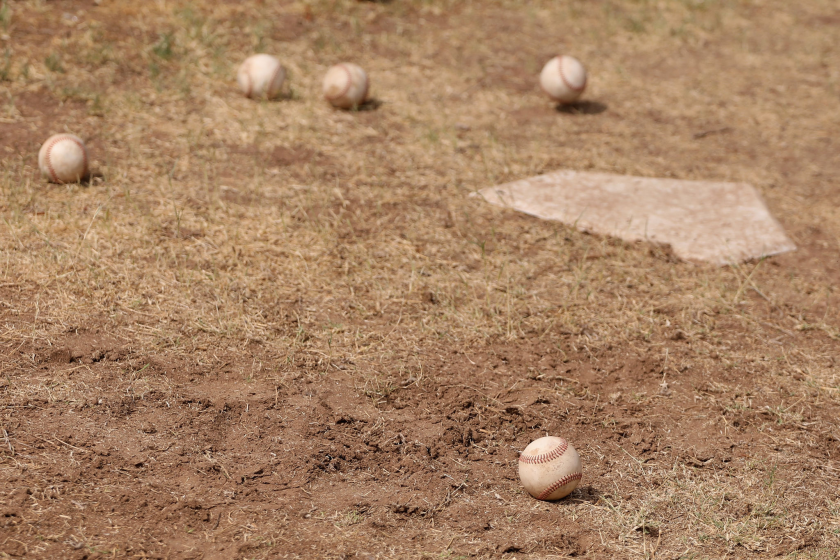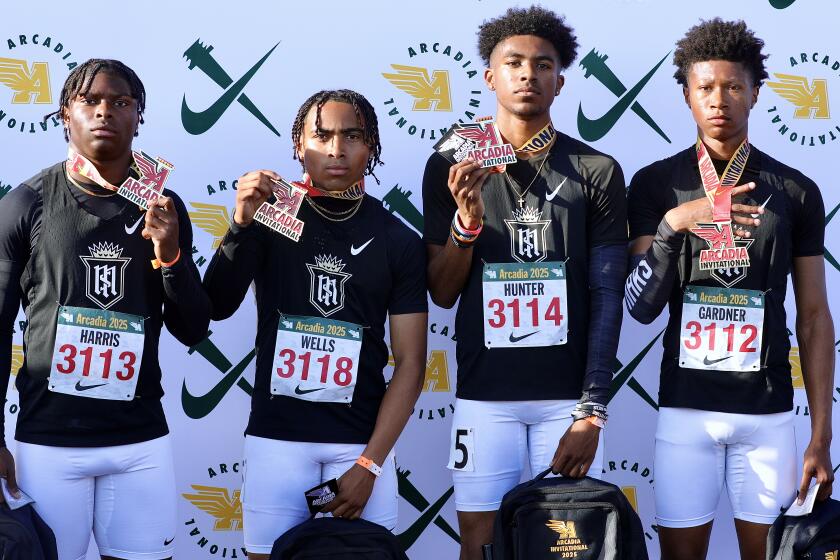Raiders: We Were Forced to Flee
- Share via
In a court case that could prove pivotal in determining the future of the NFL in Los Angeles, the Raider franchise alleged Tuesday it still “owns” the market here for NFL football even though the team returned to Oakland six years ago. NFL Commissioner Paul Tagliabue, however, said that simply isn’t so.
The Raiders, in comments the league’s attorneys said later were simply without merit, also declared to a Los Angeles Superior Court jury that they were forced to flee back to Oakland, the team’s original home, after league interference with a proposed $250-million stadium deal at Hollywood Park in Inglewood.
At a minimum, the Raiders said, they are owed $1.2 billion in damages. The team also is claiming punitive damages, to punish the league. The NFL said the Raiders are owed nothing--that owner Al Davis took the Raiders back to Oakland because he simply got a deal there he liked better.
The trial is expected to last until May. Should the Raiders prevail, and if a jury awards anything near the sum the team is asking for, it will give Davis enormous leverage to affect his team’s destiny and that of any future NFL expansion into Los Angeles. Los Angeles has been without NFL football since first the Rams and then Raiders left, both in 1995.
Davis has since told others he wants to move back to Los Angeles. Never known for being bashful, he took up a position Tuesday in the front row of the packed courtroom--in an extra chair at the end of a row, placed so that jurors would have to walk by him as they left the room. If any jurors wished to do so, they could have seen Davis’ 1984 Super Bowl ring on his left hand--the ring the Raiders won when they were in L.A.
If there remains a Raider fan base in L.A., as loyalists insist, it was scarcely in evidence at the courthouse. Only one longtime Raider fan, Tyrone Butterfield, 31, showed up outside the courtroom. He carried a sign that read, “Come back to LA, Al--we love the Raiders.”
Davis declined news photographers’ requests to pose for a picture with Butterfield. “I’m not getting involved in that,” Davis said.
Earlier, asked point-blank by reporters if the team is once more headed south, Davis replied, “We’re not here to discuss that right now. We’re here to discuss the NFL’s destroying L.A.’s opportunity to have a privately financed stadium.”
When asked to discuss the probabilities of prevailing at the trial, Davis was more forthcoming. He said, “There’s no question we should be paid. The only question is the number.”
The Raiders moved to Los Angeles in 1982. Their claim that they own the L.A. market rests on a complicated piece of legal history.
In 1983, the Raiders won millions of dollars in damages against the league after claiming the NFL had violated antitrust laws in seeking to block the team’s move.
Later, the two sides settled. As part of the settlement, the Raiders’ award--which with interest had grown to $64.3 million--was trimmed by an “offset,” defined as the difference between what the NFL could get for a new team in L.A. minus the value of a new team in Oakland.
The offset totaled $46.3 million. The Raiders were thus paid $18 million. The offset gives rise to the Raiders’ position that they in essence paid $46.3 million for the L.A. market and still own it.
In his opening remarks to the eight-man, four-woman jury, Raider attorney Joe Alioto said that as far back as 1960, when the NFL Cardinals moved from Chicago to St. Louis, the league established a precedent for paying a team moving from a more-valuable TV market to a less-valuable market.
Alioto also pointed out payments ranging from $3 million to $10 million to several teams--the San Francisco 49ers, New York Giants, Pittsburgh Steelers, Baltimore Colts and Cleveland Browns--in connection with the 1966 merger of the NFL and the American Football League.
His point? That other franchises get paid--but not the Raiders, the object of what Alioto called “disparate” and “discriminatory” treatment from the NFL.
Tagliabue, testifying as the first witness in the case, said that the Cardinal case was the “only time” in league history a payment was made in connection with a relocation.
He said the merger payments did not involve teams that had moved from one city to another--which, obviously, the Raiders had done.
He said of the $46.3 million offset: “This was a settlement. It was not a sale.”
And Tagliabue flatly declared the league’s position that it owns the L.A. market, not the Raiders: “Once they moved that franchise to Oakland, they owned nothing [in L.A.] under our league constitution and bylaws.”
Tagliabue is due to resume testifying today.
More to Read
Go beyond the scoreboard
Get the latest on L.A.'s teams in the daily Sports Report newsletter.
You may occasionally receive promotional content from the Los Angeles Times.










